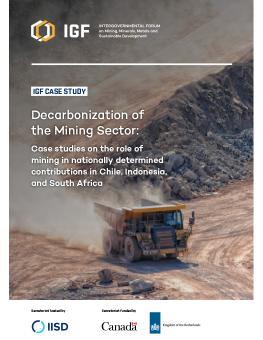
IGF Case Study: Decarbonization of the Mining Sector
Case studies on the role of mining in nationally determined contributions in Chile, Indonesia, and South Africa
Providing a comprehensive understanding of how different countries are navigating the complexities of maintaining a robust mining sector, supplying the world with critical minerals, and reducing emissions from coal mining and use.
In the journey toward limiting GHG emissions, decarbonizing the mining sector is critical to aligning global industries with international climate commitments and achieving the objectives set out in the Paris Agreement. As the demand for minerals and metals essential for energy transition technologies surges, it becomes increasingly important to manage the environmental impacts of their extraction and processing.
This report, featuring case studies from Chile, Indonesia, and South Africa, delves into the role of the mining sector in national efforts to reduce GHG emissions and highlights the challenges and opportunities inherent in this transition. It serves as a background document to the main scoping study, Decarbonization of the Mining Sector: Scoping study on the role of mining in nationally determined contributions.
Chile, Indonesia, and South Africa have been selected for their significant contributions to the global mining industry and their unique approaches to integrating decarbonization strategies within their national frameworks. These case studies provide a comprehensive understanding of how different countries are navigating the complexities of maintaining a robust mining sector, supplying the world with critical minerals for the dual energy and digital revolutions, and reducing emissions from coal mining and use while committing to substantial GHG emissions reductions.
For each case study, the role of the country in global mining production, as well as the weight of the mining sector in each domestic economy, is assessed. Then, GHG emissions at the country level and from mining-related activities are studied before focusing on international commitments and targets. Finally, national policies and approaches by countries to support the decarbonization of their mining sector are presented. These case studies show how countries can supply raw materials for the energy transition globally while ensuring that their mining sectors contribute to their national sustainable development.
You might also be interested in
Financial Benefit-Sharing Issues for Critical Minerals: Challenges and opportunities for producing countries
Exploring nuances in the key features of critical minerals and the new challenges and opportunities they present to fiscal regulation.
ASEAN-IGF Minerals Cooperation: Scoping study on critical minerals supply chains in ASEAN
IGF-ASEAN study exploring opportunities arising from rising demand for critical minerals and metals to fuel the energy and digital transitions.
Searching for Critical Minerals? How metals are produced and associated together
Outlining how metals are produced and are associated together in mineral deposits, focusing on critical minerals for the energy transition.
Artisanal and Small-Scale Mining of Critical Minerals
This report examines the potential for artisanal and small-scale mining (ASM) to take an expanded role in the global supply of critical minerals.